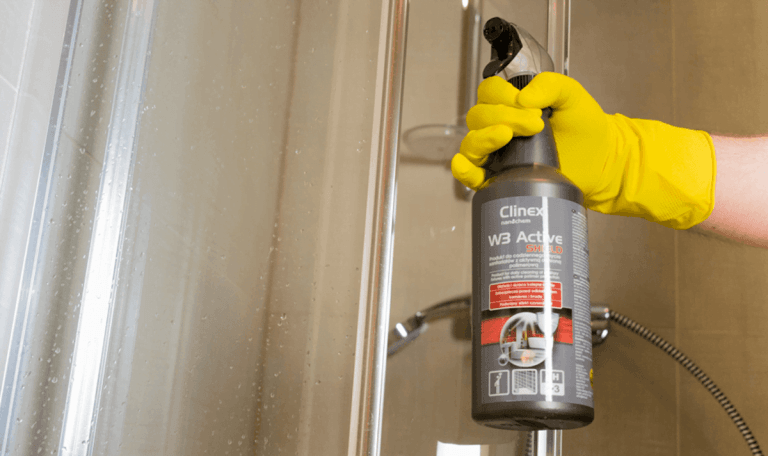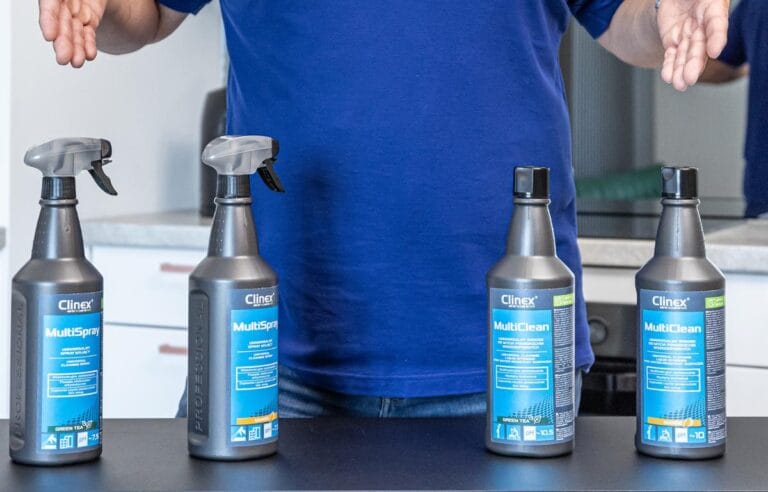Previously used primarily in garages, terraces, utility or industrial rooms, epoxy and polyurethane resin floors are increasingly being used in apartments and family houses. This is a very good solution when we want to keep our home in a minimalist style. It is also especially recommended for allergy sufferers. An additional advantage of this solution is the possibility of creating a floor with a 3D effect, which will certainly attract the attention of all guests.
From the article you will learn:
- What are the different types of resin floors?
- Where resin floors are used
- How to care for resin floors
- Is manual or mechanical cleaning better for cleaning floors?
Types of resin floors
There are several types of resin floors on the market – depending on the installation, room, application or operation.
The first type is thin-layer resin flooring , as the name suggests – these are thin floors, about 0.5 mm thick, which are the only ones we can make ourselves without the use of specialized tools. Their main disadvantage is durability and therefore they are not suitable for kitchens, halls or living rooms.
The next type of resin floors are thick-layer floors . These are floors for which we need to hire a professional team to install. The installation process itself is very similar to pouring self-leveling mortar. These floors are – compared to thin-layer floors – much thicker, because their thickness ranges between 2 and 4 mm. The greater thickness makes this type of flooring more durable, making it easily suitable for living spaces. After applying such a floor, an impressive effect resembling a sheet of glass is created. The disadvantage of this type of flooring is the lack of resistance to scratches and dullness.
The last and definitely the most durable type is coarse-grained quartz floors . Its durability is primarily due to its filling with natural, clean sand. This solution also allows you to create unique patterns that expose the texture of the material.

Please also remember that there are epoxy and polyurethane resins . Epoxy resin gives a matte surface. Therefore, if we want a glossy effect, we must additionally varnish it. Another disadvantage of this resin is its sensitivity to UV radiation. It may change color when exposed to sunlight. However, in the case of applying polyurethane resin – after its application, without the need to varnish, we can obtain ready-made smooth or matte surfaces. In both cases, it is recommended to cover the furniture with felt due to the risk of scratching less durable floors.
Application of resin floors
Resin floors conduct electricity. For this reason, they are used in warehouses, production rooms, offices, laboratories and hospitals. They contain electronically controlled machines, devices and equipment. They are also used in places where there is a risk of explosion and there is a concentration of flammable gases and vapors. The substrate on which resin floors are applied must be cleaned, primed and leveled. Additionally, copper tapes responsible for dissipating electric charges are also attached. The tape is connected to the main ground wire, and sometimes directly to the ground.
Resin floors are used not only in industrial halls, medical facilities, offices, warehouses and shops. This type of finishing is also used in residential buildings. They are characterized by high functionality and aesthetic values. They are especially popular in modern homes, where large spaces dominate. These are the most popular types of floors in the hall, living room or open kitchen. They are easy to keep clean. By using high-quality products, we get a shiny, streak-free floor.
Composition of resin floors
Epoxy can be two- or three-component. The base is always liquid epoxy resin. In the two-component version, the filler is mineral pigment and quartz sand. However, in the three-component version, an amine hardener is added, which is a single- or multi-fraction pigmented mineral filler. Polyurethane floors are based on a polyurethane resin, and additional ingredients include a filler, modifying agents, mineral pigments, and sometimes also an organic solvent. Epoxy-polyurethane floors consist of epoxy resin modified with polyurethane. A filler and mineral pigments are added, as well as a plasticizer, modifying agents and a modified amine hardener. Acrylic resin floors have a composition based on a binder, which is a solution of polymer in monomer or monomer. Benzol peroxide acts as a hardener. The acrylic mass is completed with a mineral filler.
Resin floors in shopping malls
Resin floors can also be found in large shopping malls. This is the most frequently chosen type of floor for this type of facilities. One of the reasons is also to maintain cleanliness. Resin floors in shopping malls are most often cleaned by machine. The lack of gaps allows for easy cleaning. This is especially beneficial in the fall and winter. To keep the floors properly clean, special cleaning products are used. Their task is not only to remove all dirt, but also to care for the floor. Their shiny appearance is given by special cleaning machines combined with appropriate preparations. It is worth emphasizing here that the resin floor is resistant to chemicals. Therefore, you can use highly concentrated cleaning products containing active substances.
How to care for resin floors?
For daily care of resin floors, you can use standard floor cleaning products. An example of such products is the ClinexFloral line. These are concentrated, effective preparations for daily care of all waterproof floors. The washed surfaces are characterized by a delicate shine. Additionally, they leave a long-lasting pleasant scent in the room. The preparation evaporates quickly, leaving no streaks or stains. This product is available in four pleasant scents.
Another example of a preparation that we can use to clean resin floors is Clinex Nano ProtectFloral . It is a low-foaming cleaning preparation containing silicon nanoparticles and polymers. Thanks to these particles, the surface remains clean for longer, and the subsequent cleaning process is much easier. Its additional advantage is the fragrance composition used, which does not contain allergens.
If we have a larger surface to clean, we can use Clinex M6 – a low-foaming, universal product for everyday cleaning of waterproof floors.
How to use resin floor care products
All mentioned Clinex products for cleaning resin floors are concentrates, i.e. products intended for dilution with water. Both ingredients should be combined in appropriate proportions. ClinexFloral is used diluted with water in the range of 25-200 ml / 10 L of water, depending on the degree of dirt. For manual and machine washing, mix Clinex Nano ProtectFloral with water in the proportions of 50-100 ml/10 l of water. In the case of Clinex M6 Medium, when washing by machine, prepare a solution of 0.5-2% – 50-200 ml per 10 liters of water, and when washing by hand, 50 – 500 ml per 10 liters of water.
Mechanical and manual cleaning
For large surfaces, we recommend using special cleaning machines. Not only do they effectively remove difficult dirt in a much shorter time, but they also make the work of the cleaner much easier. Clinex Nano ProtectFloral and Clinex M6 Medium are intended for machine cleaning. In small rooms, you can clean the floors manually using a mop.
Resin floors are floors with many advantages. From fancy, if we choose a 3D motif, through ease of keeping clean – which is a big advantage for allergy sufferers, to high durability. Before installing such a floor, we must consider the type of material from which we want to make it so that we can enjoy its appearance for many years.
A resin floor is a floor that will last for years
Resin screeds have the unique advantage of long-term durability. When investing in such floors, we know that we are investing in a floor that will last for years. The condition for this state of affairs is to install floors of decent quality and, of course, properly care for them. You can’t save on material or cleaning products. It is worth focusing on the highest quality products that will keep your floors in perfect condition. By using Clinex products, we can be sure of proper care. Active ingredients contained in cleaning products ensure not only cleanliness and freshness, but also proper maintenance of the floor.
Summary
- Among the resin floors, we can distinguish thin-layer, thick-layer, coarse-grained quartz, epoxy and polyurethane resin floors.
- Resin floors are used in warehouses, industrial and production rooms, offices, hospitals, laboratories, but also in residential buildings.
- For the care of resin floors, we use standard floor cleaning products, such as ClinexFloral, Clinex Nano ProtectFloral and Clinex M6.
- The agents are in the form of concentrates, which we dilute with water in appropriate proportions depending on the degree of dirt and the washing method – manual and mechanical.
- It is better to use mechanical cleaning on larger surfaces, using an appropriate product – Clinex Nano ProtectFloral and Clinex M6 Medium






